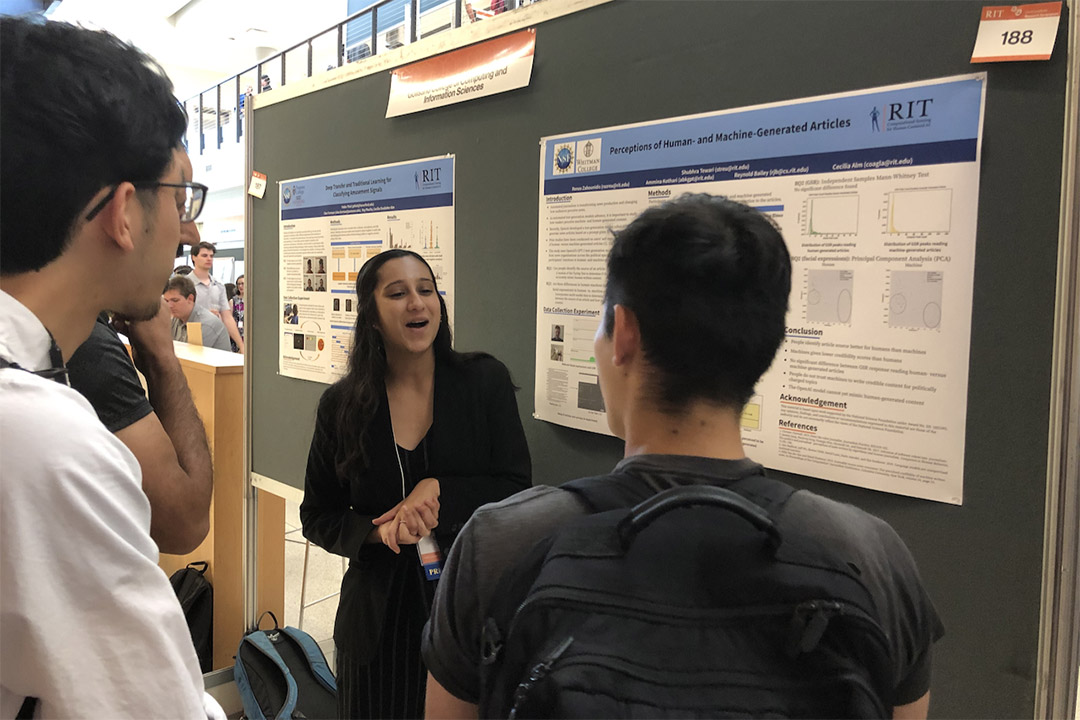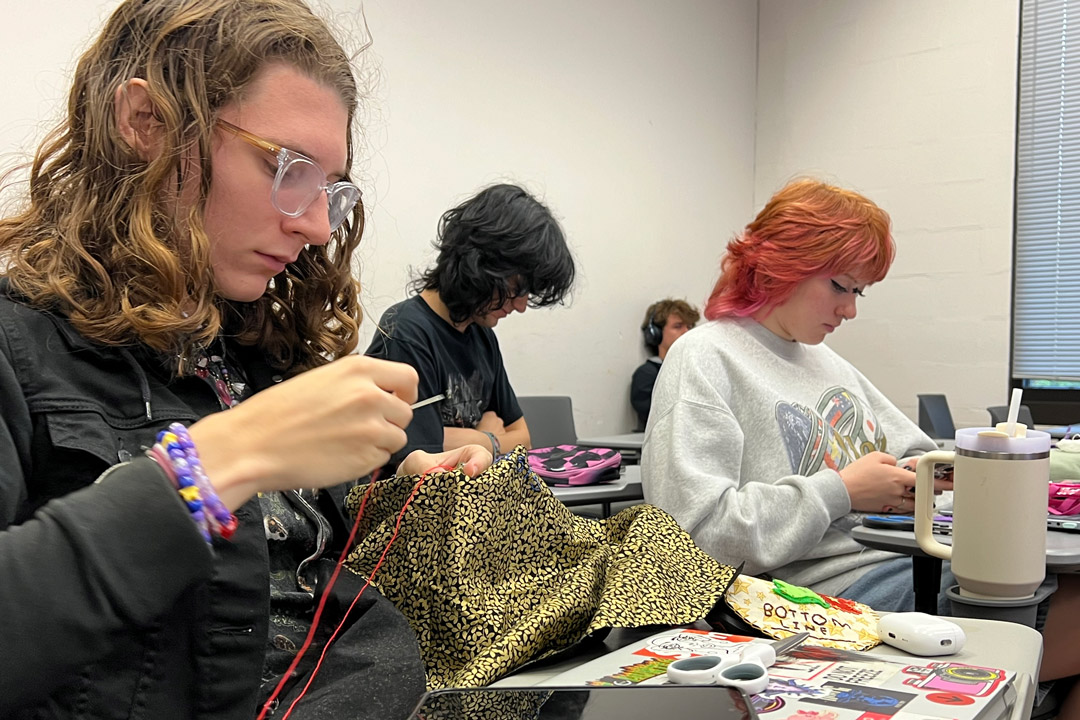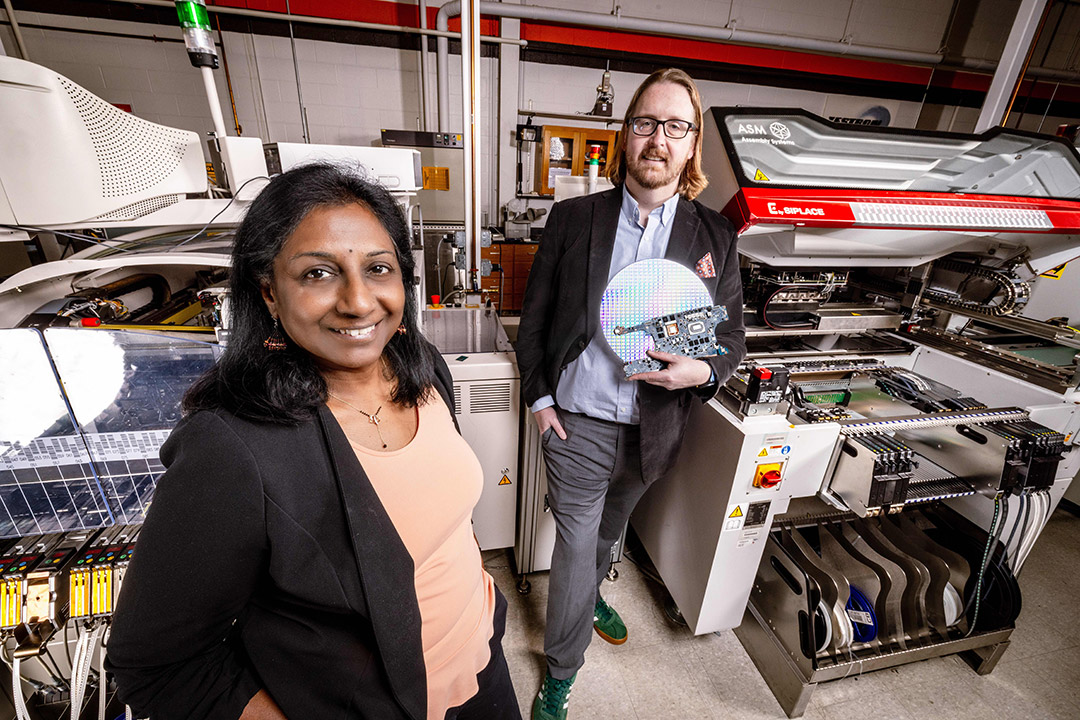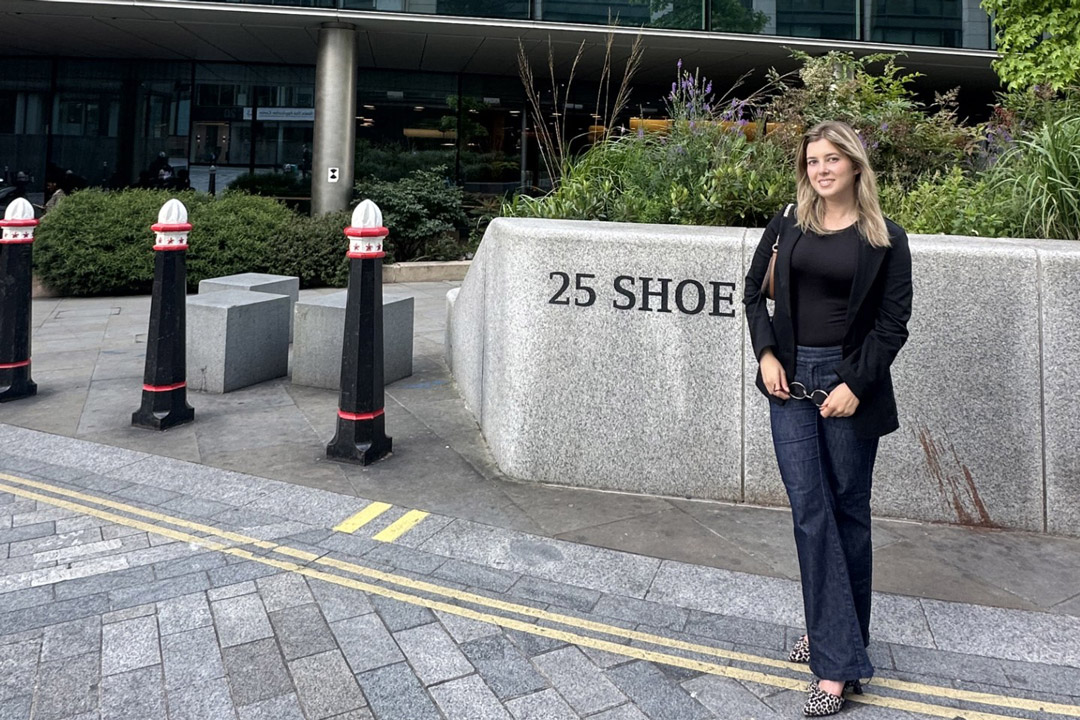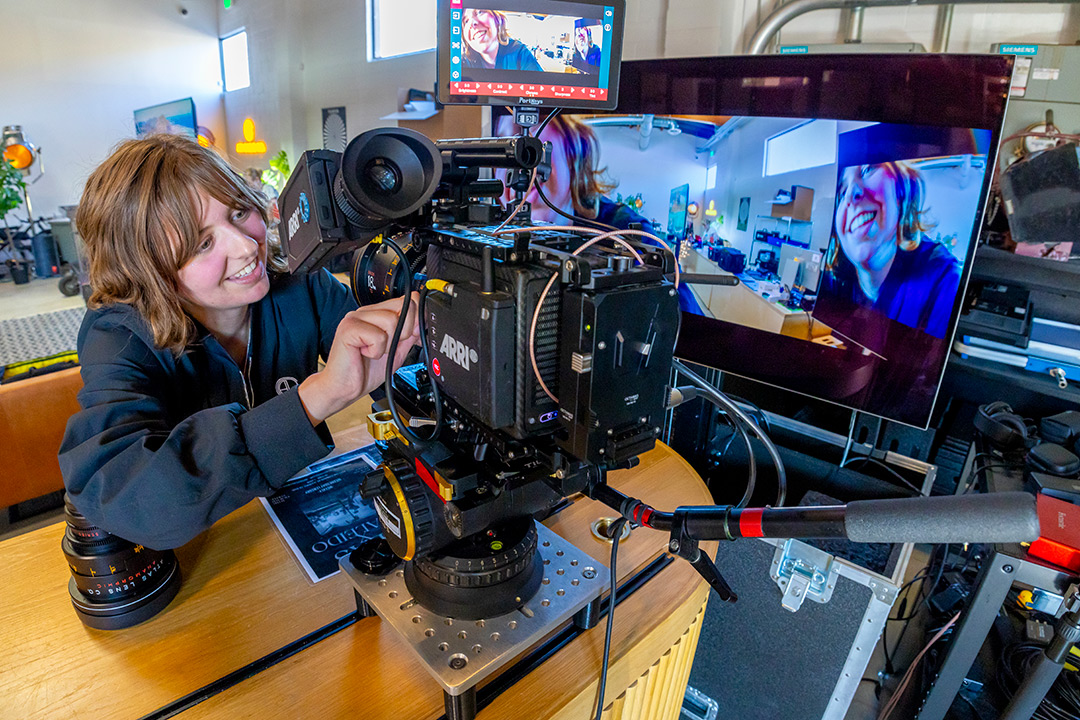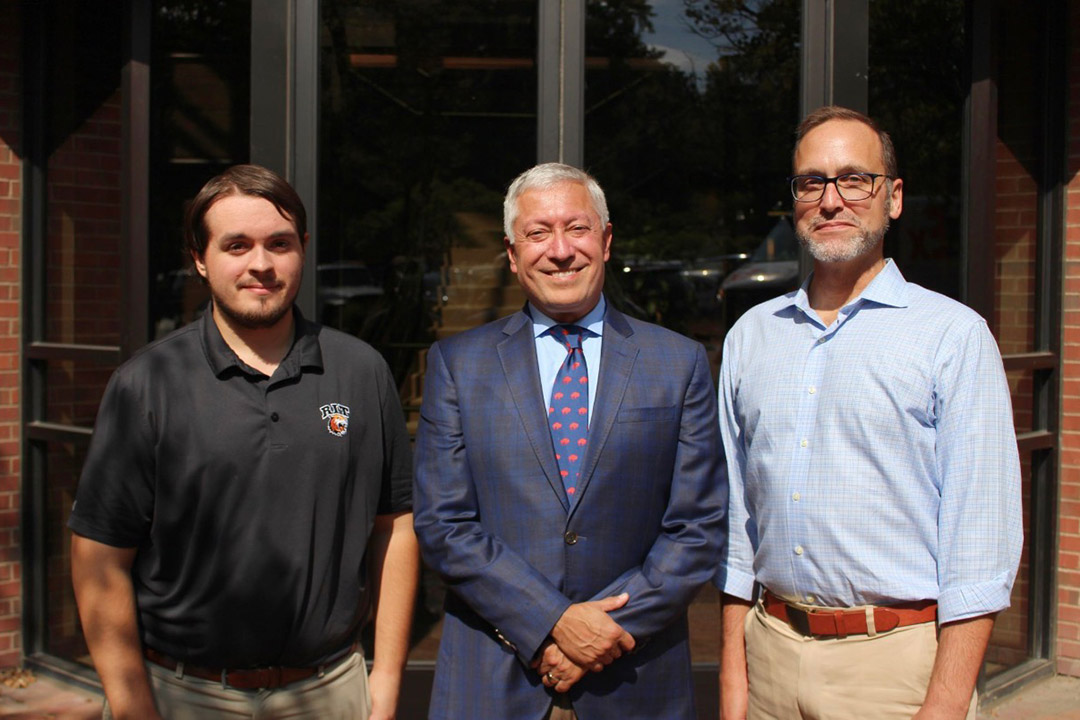Undergraduates nationwide to explore human-centered AI at RIT
Undergraduate students from around the country will be coming to RIT to enhance interactions between human and artificial intelligence (AI) agents.
Over the next three years, the Research Experience for Undergraduates (REU) Site in Computational Sensing for Human-centered AI will welcome nine undergraduate students each summer to RIT’s campus. The REU Site is funded by a grant from the National Science Foundation.
The program is designed for undergraduate students to experience and develop a passion for research and receive guidance for pursuing graduate careers. The students will work on research projects that contribute to the advancement of generative machine learning techniques that could improve human-AI interaction and collaboration.
This is the third time RIT is running a REU Site focused on human-centered AI. The site is led by Reynold Bailey, principal investigator and professor in the Department of Computer Science, and Cecilia Alm, co-principal investigator and professor affiliated with RIT’s Department of Psychology and School of Information.
One key addition to the upcoming cohort is a collaborative partnership between the REU Site and RIT’s AWARE-AI program for graduate students.
“Undergraduate students often ask, ‘How do I know if I’m on the right track in my research’ or ‘What is research like at the graduate level?” said Bailey. “Having near-peer mentors is crucial, as graduate students can often bridge that gap and make the research process more approachable.”
For the REU, participants will work in teams of three on projects that may include assistive robotics, concurrent multimodal AI generation for educational use cases, and brain-inspired generative AI for a resource-efficient future. Participants will design and implement generative AI frameworks, conduct experiments, analyze data, and create visualizations.
Throughout the summer, REU students will also take part in professional development activities designed to support their growth as researchers. Workshops will cover statistics for scientists, what it means to be peer reviewed, and best practices for giving a talk, preparing a poster, and submitting a technical report. It will also include a teaching-to-mentoring bridge series, which helps students shift from classroom learning to collaborative discovery.
“When you’re being taught in classes, the professors already know the answers,” said Bailey. “In research, we don’t know the answers and we’re working together to find them.”
Additional enrichment activities include a seminar on grant writing for the NSF Graduate Research Fellowship Program, a Q&A with Professor Pengcheng Shi, director of RIT’s computing and information sciences Ph.D. program, a journal club, mentoring café, an industry field trip, and social team-building events.
At the end of the summer, students will present their work at RIT’s annual Undergraduate Research Symposium. In previous cohorts, many REU students continued refining their projects for publication and conference presentations.
In 2022, while completing his undergraduate degree at University of California Santa Cruz, Grant Bosworth participated in RIT’s Computational Sensing for Human-centered AI REU program. Now, he is a student in RIT’s electrical and computer engineering Ph.D. program and participating in AWARE-AI.
“The REU program helped supply me with a professional environment to gain collaborative, interdisciplinary research skills,” said Bosworth. “At the time I had never participated in research and thought of the field as daunting and inaccessible. It helped establish peer and mentor connections that are still strong to this day and reinforced my identity as a researcher.”
The REU program is open to U.S. undergraduate students and is designed to build lifelong capabilities for continued research careers in computing and STEM. The nine-week RIT program includes a stipend, travel, and housing.
Applications for the summer 2026 REU Site will be accepted starting Dec. 1 via the NSF Education and Training Application website.
Latest All News
- Students ditch doomscrolling for hand-stitched expressionCasting aside the daily doomscroll and picking up a slow hobby like hand-stitched embroidery can provide a much-needed brain break for students. It can also open the door for them to give back to the community while expressing themselves. Get your own patch The Visual Activism class’s patch sale will begin on Friday, Nov. 7, from 5 to 8 p.m. at The Op Shop. Remaining patches will be on sale at the shop through Jan. 1, 2026. Professor Hinda Mandell introduced students to this rejuvenating, slow hobby through a new Visual Activism course. The students’ efforts to create and sell hand-stitched patches and buttons will directly benefit Foodlink, a Rochester-based nonprofit dedicated to ending hunger and building healthier communities by addressing the symptoms and root causes of food insecurity. Each student in the Visual Activism class created three patches or buttons—hand-stitched with their own personal messages—to be sold at The Op Shop during the Nov. 7 First Friday Rochester citywide event. The bulk of the sales will be donated to Foodlink, and a portion of the proceeds will go to The Op Shop, a local vintage store owned by Joanna (Jo) Carroll. The students submitted pitch papers and voted as a class to select a local charity to support. Eva Witten, a second-year cybersecurity major from Hartford, Conn., said giving back to the local community through her handmade work was a meaningful opportunity. “It feels like I’m contributing to something that matters. It’s an act that makes a direct, measurable impact, while also being something that I enjoy working on,” she said. From hand-stitched patches and ribbons, to hand-sewn shirts, to zines expressing their own personal activist manifestos, Mandell said her goal when crafting assignments for the course was exposing students to the variety of ways they can express their beliefs beyond spoken or written words. “So much activism today, especially for university students, seems to unfold in online spaces,” said Mandell. “I believe in the benefits of hand stitching and engaging with an act that is slow and methodical. I wanted students to have a tactile experience that really connects their own beliefs and opinions to something that they can hold.” This is the first semester Mandell has offered Visual Activism. When she asked The Op Shop to collaborate, Carroll thought that the coursework was a perfect fit for a First Friday event at the shop. Carroll curates monthly exhibitions at the shop in collaboration with First Friday to highlight local artists. This month, the spotlight will be on the Visual Activism students’ work. Jennelle Hart/RIT Professor Hinda Mandell said the patch and button project’s open-ended nature allowed her students to pursue topics that “expressed a piece of their heart,” and that the students were “truly delighted” by the work of their classmates. “November holds a collective pulse: a time when voices rise to be heard, when we exercise our rights through voting, and when nature itself reminds us of cyclical change,” said Carroll. “Through weaving, stitching, and felting, the students channel the physical and political forces that shape our world. Each piece reflects the belief that creation itself is a form of protest.” Witten said she carries her skills and knowledge of hand stitching outside of the classroom. From helping other students in her dorm mend their clothing, to forming friendships through conversations sparked by her expressive patches, Witten found that the hobby has opened doors to cultivating community both on campus and in her chosen field of study. “Art is the penultimate version of self-expression. I think it has an impact on the people who see me wearing the art I’ve made,” she said. “What that impact is, is for them to decide. But I think that through influencing others with these patches, I can promote this idea of self-expression in my career field.” Vivian Contreras, a fourth year student enrolled in the combined accelerated bachelor’s/master’s degree program, said the Visual Activism coursework connects to why she chose criminal justice as her major. Her goal after graduation is to become an immigration attorney, so her three submissions followed a theme of immigration advocacy. “I’ve spent close to three years focusing on immigration. I felt like this assignment was an opportunity to show what matters to me and what has been on my mind. It felt like I finally had a space where I could visually show what I’ve been researching and studying for so long,” she said. Contreras, from Mount Airy, Md., plans to incorporate a form of hand-stitching activism outreach into her master’s degree capstone project, in which she anticipates connecting with local immigrant and refugee communities. “I think that hand stitching is a really good way to make activism tangible. I’m hoping to take what I’ve learned from this class and show it to other people so they can also speak their mind. I hope this approach to advocacy can help these communities to speak out,” she said. Bussing is available for students interested in attending First Friday Rochester events. For more information about the Visual Activism course and crafting activism, email Hinda Mandell at hbmgpt@rit.edu or follow her on Instagram. Go to The Op Shop’s website for more information about the shop.
- Faculty members launch electronics manufacturing training for veteransTwo RIT faculty members are building a comprehensive workforce development program in manufacturing for veterans and under-employed individuals to provide the needed skills-based training in electronics assembly. Participants will be prepared for positions in advanced manufacturing, including filling gaps for needed positions in semiconductor processing. They will also qualify for national credentialling in electronics assembly and manufacturing through the sessions, said Martin Anselm, professor and interim department head in RIT’s College of Engineering Technology. “There are jobs here in Rochester for technicians primarily in setting up and managing manufacturing lines and overseeing quality assurance and inspection of products coming off the lines,” said Anselm, who will lead both the hands-on training and oversee the credentialling process. “These are very powerful standards that most companies need to certify their technicians. So, we are offering veterans that credential even before they get a new job.” Anslem and co-project leader, Malar Hirudayaraj, associate professor of management in RIT’s Saunders College of Business, received more than $700,000 from the New York State Department of Labor to launch the two-year program. This will be the fourth time RIT has conducted the program since it began in 2016. To date, it has an 80 percent average job placement record for participants. Beginning in late fall, members of the Veterans Outreach Center, collaborative partners on the project team, will be recruiting area veterans for the program. They will also track participation, hiring, and retention during and after the sessions. Participants will receive an overview of the electronics industry, and hands on practice in RIT’s Center for Electronic Manufacturing and Assembly (CEMA), a nationally recognized facility to teach, train, and provide industry testing in surface mount technology and in printed circuit board design, placement, and packaging. The center’s training and research operations experts provide services to regional and national companies in semiconductor chip packaging, printed circuit board assemblies, and electronics/optoelectronics systems. All program content will include topics required for credentialing and will be supplemented with workshops in interpersonal communication, project management, and leadership skills. “Beyond the hands-on training and credentialling, our goals are to prepare the trainees to transition to work in the civilian world,” said Hirudayaraj, who specializes in organization development and leadership training. “These are employability skills and a way for the veterans to be successful in the civilian workplace which may be different than what they are used to.” New this year is a stipend for each participant to support their training. “We plan to do this six times over the next two years so that we will have trained 60 veterans from the Greater Rochester area,” said Anselm, who has expertise in surface mount technology, electronics failure analysis, and root cause analysis, with research interests including solder joint reliability and advanced manufacturing process development for electronic assemblies. Supporting veterans toward careers is one part of the program. Anselm and Hirudayaraj will also develop a complementary program for companies that hire veterans to help with their transition from the military to careers in civilian life. “We want to develop this part of the program, in conjunction with local companies, to get their input regarding how to help support these veterans. What is it that veterans struggle with? What is needed to understand veterans’ issues to better retain them?” Anselm said. “This has never been taught by RIT before, and we are trying to build this in such a way that it has a broader reach beyond the Rochester area.” Beyond entry-level positions and retraining opportunities, the program can be a means for participants to advance in manufacturing though positions as line managers, or team and shift management positions. They could also attain two- or four-year degrees through area colleges such as RIT where its Veterans Upward Bound initiative supports these efforts, Anselm said.
- Students take the lead in growing sustainability programThe Climate and Sustainability Leadership Program (CSLP) is evolving from a pilot project into a movement powered by students who are learning that leadership in sustainability begins with making connections. Launched in 2024, the program which is an initiative of RIT’s Office of Sustainability, brings together students across all majors to learn through campus discussions, peer leadership, and hands-on experiences with Rochester-area partners. This year, students are taking the reins of the program with the introduction of paid catalyst roles—leadership positions which give participants a larger hand in shaping the program’s direction. The four catalysts—second-year students Jade Lewis (environmental science), Martin Bassett (mechanical engineering), Thomas Wills II (computer engineering), and Isaac Othuon (electrical engineering)—are alumni of CSLP’s inaugural class. They serve as bridges between staff and fellow students by helping to organize events and leading sustainability discussions with campus and community leaders. E Turpin, program specialist for Sustainability and Strategic Planning, co-facilitates the program with Tom Connelly, assistant director for Campus Sustainability. They work closely with the catalysts. “Our goal is to catalyze connection,” Turpin said. “We are exploring what long-term student leadership can look like in sustainability at RIT and how students can continue to grow over two, three, and four years.” CSLP launched with 60 students in its first year. Today, nearly 140 students are part of the program. With that growth has come a more intentional design, including faculty-supported discussion sessions along with interesting weekend programs, providing an avenue for student-led support. Carlos Ortiz/RIT Frank Keophetlasy, community farm manager at Foodlink, talks to members of the Climate and Sustainability Leadership Program during a Rochester Sustainable City Tour. During the academic year, students participate in a mix of off-campus excursions and on-campus “Coffee Hours,” exploring themes like environmental justice, food systems, and civic engagement. Fall events included an Erie Canal reflection, a native planting project at Tait Preserve, and a Rochester Sustainable City Tour. In November, CSLP will partner with RIT’s Center for Leadership and Civic Engagement to host Omar Aponte ’24 Ph.D. (sustainability), data manager at the Climate Solutions Accelerator. These programs are tied to the United Nations Sustainable Development Goals, giving students a structured framework to connect their experiences to the organization’s 17 global challenges. The program’s experiential approach has broadened students’ perspectives on what sustainability means and gives returning participants a chance to support others on that journey. “All I thought was sustainability was recycling and green energy,” Othuon said. “I never realized that was just part of it. There was a social aspect that I did not even consider. As a catalyst, I am still learning, while also helping others come to their own epiphany moment.” For Bassett, stepping into a catalyst role has been an opportunity to give back. “The most rewarding part has been helping create the same positive experience that I had last year,” Bassett added. “It’s meaningful to support newer members and give back to a program that inspired me in the first place.” Lewis noted that leading events like the Erie Canal reflection has strengthened her communication skills and confidence, and she applies those experiences to her work leading the Zero Waste Arena team on campus. “CSLP improved my communication skills and opened my mind to different attitudes about sustainability and leadership,” she said. “It's exciting to see the different ways we can equip students as sustainability leaders and foster conversations about sustainability at RIT.” Wills said the community dimension of the program has been key to his involvement since day one. “I’ve always felt a moral responsibility to take care of the planet and our fellow humans,” he said. “CSLP’s greatest asset is its ability to connect members with passionate people and projects in Rochester and beyond.” The team sees this ‘Pilot 2.0’ as foundation for building a multi-year leadership pipeline and to give students a feeling of agency. “CSLP is still young, but we see it as a place where students can explore how their studies, whatever their field, intersects with building a sustainable future,” Turpin said. “At the start of the program, we always ask whether students feel hopeful about the future of sustainability,” Othuon added. “It’s usually split. But as the program goes on, I want people to realize they’ll be at the wheel of change someday.”
- Global scholars gain international professional and personal experiencesNatali Belusic wanted to learn about business while having the opportunity to be immersed in an English-language environment. RIT Croatia was the perfect choice to achieve that, and it opened the doors for international learning and experience. After landing a summer internship at Goldman Sachs in London, Belusic is now studying on RIT’s main campus in Rochester as part of the global scholars program. Global campuses RIT has global campuses in Dubai, Croatia, and Kosovo. Learn more about degree programs offered at each campus and how to study abroad at a global campus. The global scholars program brings students from RIT’s international campuses to study for up to two terms at the Rochester campus. The experience gives students a chance to diversify their cultural perspectives, expand their academic horizons, and build their professional networks. The program, in its 15th year, welcomed its largest group of 77 students this fall. When it began in the 2010-2011 academic year, there were just six global scholars. Alumni of the program have gone on to successful careers. One former student helped build a system for the International Space Station then went on to Columbia University to pursue a master’s degree. Another is the curator of the National Gallery of Kosovo. Others work for companies including TikTok, Coca-Cola, and Amazon. Belusic is studying international business. She already gained valuable real-world experience while interning at Goldman Sachs’ risk division for nine weeks. While she didn’t think she would get the internship because of how selective and competitive it is, she felt well-prepared when applying. “RIT helped me prepare for the internship in terms of courses that I had and helped me shape my résumé and cover letter, give me knowledge on how to approach interviews, and network, as well,” she said. Now Belusic is using her time in the U.S. to broaden her academic and professional portfolio before graduating this spring. Then she will begin a full-time role back at Goldman Sachs in London next summer. “I decided to take the opportunity of additional courses and resources here that are not offered in Croatia,” said Belusic. “For example, the Bloomberg terminals that we can use and social perspective classes gave me benefits for my academic journey.” Another opportunity Belusic had while studying in the U.S. was to publish a research paper with one of her professors from Croatia. She did this through the honors program with the International Conference on Business, Management, Economics, and Information Systems hosted by The City University of New York. Experiences like Belusic’s are what make the global scholars program and RIT’s international connections a benefit for students.The program gives international students the chance to complete minors and participate in research projects that may not be offered at their home campuses. These benefits lead to impressive career opportunities. While Belusic has always been interested in working abroad, it may seem daunting for some students to travel and study in a different country. However, Belusic explained that going to a new place with a new environment helps a person learn more about themselves and how they handle different situations. “Study-abroad experiences have always exceeded my expectations,” said Belusic. “There are so many reasons to do it and so many support systems. Say yes to all the opportunities wherever you may go.”
- ‘TheWrap’ recognizes RIT as one of the nation’s top film schoolsForward-thinking faculty; curriculum that fuses technology, the arts, and design; and a legacy of priming students with a maker mentality helped RIT’s School of Film and Animation (SOFA) maintain its place on TheWrap’s list of Top 50 Film Schools of 2025. This year, RIT ranked 32nd on the list. “We are very excited to have been ranked again by TheWrap. This is evidence of the amazing work our students and faculty are doing every day. The interactions and collaborations between our live action, animation, and motion picture science students prepare all of them for the challenges and opportunities brought by what is probably the most dynamic time in our industry,” said Ricky Figueroa, SOFA director and John Traver Professor. Over the last year, the film and animation school increased its reputation in Hollywood, earning recognition from publications like Variety, The Hollywood Reporter, and Animation Career Review in addition to TheWrap. When granting this year’s rank, TheWrap stated that RIT is well positioned to help students in the era of rapid technological change ushered in by digital tools and AI. The publication also noted that the university is at the forefront of these trends and puts industry-standard tools into the hands of students, citing facilities like MAGIC Spell Studios as evidence of RIT’s dedication to the fusion of creativity and technology. “The School of Film and Animation is the perfect example of RIT’s mission to utilize technology, the arts, and design to change the world. Recognitions like this affirm we are on the right track,” said Figueroa. Immersive and creatively challenging programs like RIT in LA and the new student exchange program with the Film and TV School of the Academy of Performing Arts in Prague (FAMU) offer opportunities for students to exercise their skills outside of the classroom. Experiential learning opportunities like these contribute to RIT’s legacy of nurturing a “maker” mentality in students. TheWrap stated that this legacy is evident when considering the outcomes of alumni like Alex Forsythe, senior director of science and tech at the Academy of Motion Picture Arts and Sciences; John Traver, Frame.io co-founder and creative technologist; and cinematographer Michael Slovis. Go to RIT’s School of Film and Animation website to learn more about its program offerings.
- Co-op student applies tech skills to the startup finance worldBen McManus, a fifth-year computer science student from Denver, is gaining firsthand experience in automation and IT in his co-op at Indivisible Partners, a national startup finance company co-founded by RIT alumnus and former Merrill Lynch executive Alok Kapoor ’93 (computer science). How did you first connect with Indivisible Partners? It actually came through my fraternity, Kappa Delta Rho. Alok Kapoor, one of our alumni, came to one of our formals and mentioned he was looking for students with tech experience. Our president connected us, and that’s how I got the opportunity. Greek life at RIT has been a big part of my experience. It has helped me grow as a student and a professional. What is your role during the co-op? I work as an IT technician, mainly focused on automating internal processes to make everyday tasks more efficient. I got better at communicating technical concepts in plain language, realizing not everyone speaks “tech.” I also sharpened my scripting and automation skills, which has given me more confidence in both IT and coding. What did you learn about working in a startup environment? It’s a lot of fun but it can be stressful. Every week feels different, and I had to adapt to new challenges and people quickly. But that’s what I liked about it. It’s organized chaos and learning how to work through that has made me more confident stepping into any tech team. What advice would you give to other students preparing for their co-ops or entering the job market? Take risks and use your connections. The job market is tough right now, so every opportunity to network counts. My co-op came through my fraternity, which really opened my eyes to how valuable RIT’s alumni community can be. What surprised you most about working in the financial world as a tech student? I didn’t expect to work alongside so many people who came from big firms like Merrill Lynch and Fidelity. It was eye-opening to see how much technology drives their work. It reminded me that tech touches every field, even ones you don’t normally think of, like finance.



